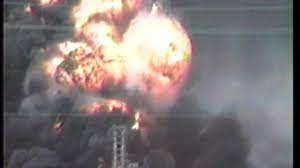Hostage crisis in Moscow theater
On October 23, 2002, about 50 Chechen rebels storm a Moscow theater, taking up to 800 people hostage during a sold-out performance of a popular musical.
The second act of the musical “Nord Ost” was just beginning at the Moscow Ball-Bearing Plant’s Palace of Culture when an armed man walked onstage and fired a machine gun into the air. The terrorists—including a number of women with explosives strapped to their bodies—identified themselves as members of the Chechen Army. They had one demand: that Russian military forces begin an immediate and complete withdrawal from Chechnya, the war-torn region located north of the Caucasus Mountains.
Chechnya, with its predominately Muslim population, had long struggled to assert its independence. A disastrous two-year war ended in 1996, but Russian forces returned to the region just three years later after Russian authorities blamed Chechens for a series of bombings in Russia. In 2000, President Vladimir Putin was elected partly because of his hard-line position towards Chechnya and his public vow not to negotiate with terrorists.
After a 57-hour-standoff at the Palace of Culture, during which two hostages were killed, Russian special forces surrounded and raided the theater on the morning of October 26. Later it was revealed that they had pumped a powerful narcotic gas into the building, knocking nearly all of the terrorists and hostages unconscious before breaking into the walls and roof and entering through underground sewage tunnels. Most of the guerrillas and 120 hostages were killed during the raid. Security forces were later forced to defend the decision to use the dangerous gas, saying that only a complete surprise attack could have disarmed the terrorists before they had time to detonate their explosives.
After the theater crisis, Putin’s government clamped down even harder on Chechnya, drawing accusations of kidnapping, torture and other atrocities. In response, Chechen rebels continued their terrorist attacks on Russian soil, including an alleged suicide bombing in a Moscow subway in February 2004 and another major hostage crisis at a Beslan school that September.
WOMEN’S HISTORY
1850
The first National Women’s Rights Convention begins
Suffragist organizers hold the first-ever National Women’s Rights Convention in Worcester, Massachusetts on October 23, 1850. More than 1,000 delegates from 11 states arrived for the two-day conference, which had been planned by members of the Anti-Slavery Society.
SPORTS
1993
Toronto Blue Jay Joe Carter wins World Series with ninth-inning home run
On October 23, 1993, Toronto Blue Jay Joe Carter wins the World Series for his team by whacking a ninth-inning home run over the SkyDome’s left-field wall. It was the first time the World Series had ended with a home run since Pittsburgh’s Bill Mazeroski homered to break a 9-9 tie with the Yankees in the seventh game of the 1960 series, and it was the first time in baseball history that a team won the championship with a come-from-behind home run.
1980S
1989
Gas leak kills 23 at plastics factory
On October 23, 1989, 23 people die in a series of explosions sparked by an ethylene leak at a factory in Pasadena, Texas. The blasts, which took place at a Phillips Petroleum Company plant, were caused by inadequate safety procedures.
ANCIENT ROME
42 B.C.
Brutus dies by suicide
Marcus Junius Brutus, a leading conspirator in the assassination of Julius Caesar, dies by suicide after his defeat at the second battle of Philippi. Two years before, Brutus had joined Gaius Cassius Longinus in the plot against the Roman dictator Julius Caesar, believing he was striking a blow for the restoration of the Roman Republic. However, the result of Caesar’s assassination was to plunge the Roman world into a new round of civil wars, with the Republican forces of Brutus and Cassius vying for supremacy against Octavian and Mark Antony. After being defeated by Antony at a battle in Philippi, Greece, in October 42 B.C., Cassius killed himself. On October 23, Brutus’ army was crushed by Octavian and Antony at a second encounter at Philippi, and Brutus took his own life.
MIDDLE EAST
1983
Beirut barracks blown up
A suicide bomber drives a truck packed with explosives into the U.S. Marine barracks in Beirut, killing 241 U.S. military personnel. That same morning, 58 French soldiers were killed in their barracks two miles away in a separate suicide terrorist attack.
CRIME
1998
Doctor is killed by anti-abortion radical
Doctor Barnett Slepian is shot to death inside his home in Amherst, New York by an anti-abortion radical. His killing marks the fifth straight year that an abortion-providing doctor in upstate New York and Canada became the victim of a sniper attack.






Comments
Post a Comment